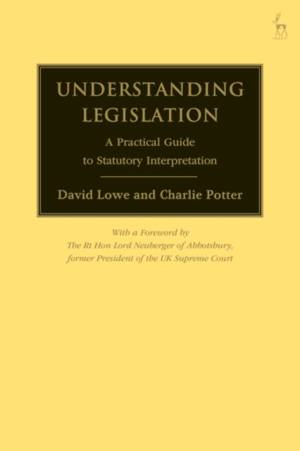
- Retrait gratuit dans votre magasin Club
- 7.000.000 titres dans notre catalogue
- Payer en toute sécurité
- Toujours un magasin près de chez vous
- Retrait gratuit dans votre magasin Club
- 7.000.0000 titres dans notre catalogue
- Payer en toute sécurité
- Toujours un magasin près de chez vous
Understanding Legislation
A Practical Guide to Statutory Interpretation
David Lowe, Charlie Potter
Livre relié | Anglais
252,45 €
+ 504 points
Description
"[This book] will be of great value to practitioners, students, academics and judges - whatever their level of experience. [...] The trouble for many legal practitioners, and indeed for many legal book writers, can be a failure to see the wood for the trees, and that is a particular risk when it comes to a subject as fissiparous as statutory interpretation. David Lowe and Charlie Potter are to be congratulated for having avoided that risk: they have written a crisp and engaging book, which covers this important topic in an informative and accessible way..." From the foreword by David Neuberger
Understanding Legislationprovides a practical, accessible guide to interpreting both English and European legislation of all kinds. This book can be used as a first port of call for practitioners and students on all matters of statutory construction. It is designed to serve as a succinct and authoritative point of reference for questions concerning sources of legislation, the anatomy and structure of differing instruments and matters of interpretation. As well as considering how to read statutory language, and the key principles and presumptions that the courts will apply, the book addresses how other legislation and materials can influence the interpretive exercise and in what way. To this end, it discusses the interpretive significance of the different components of legislation, the various external aids to construction that may exist, and the role of international law, the European Convention on Human Rights (through the Human Rights Act 1998) and EU law in interpreting domestic law. While the primary focus is on English law, the treatment of EU and international law will also serve as concise freestanding guidance as to the sources of EU law, the construction of EU legislation and the construction of treaties.
Understanding Legislationprovides a practical, accessible guide to interpreting both English and European legislation of all kinds. This book can be used as a first port of call for practitioners and students on all matters of statutory construction. It is designed to serve as a succinct and authoritative point of reference for questions concerning sources of legislation, the anatomy and structure of differing instruments and matters of interpretation. As well as considering how to read statutory language, and the key principles and presumptions that the courts will apply, the book addresses how other legislation and materials can influence the interpretive exercise and in what way. To this end, it discusses the interpretive significance of the different components of legislation, the various external aids to construction that may exist, and the role of international law, the European Convention on Human Rights (through the Human Rights Act 1998) and EU law in interpreting domestic law. While the primary focus is on English law, the treatment of EU and international law will also serve as concise freestanding guidance as to the sources of EU law, the construction of EU legislation and the construction of treaties.
Spécifications
Parties prenantes
- Auteur(s) :
- Editeur:
Contenu
- Nombre de pages :
- 336
- Langue:
- Anglais
Caractéristiques
- EAN:
- 9781849466417
- Date de parution :
- 19-04-18
- Format:
- Livre relié
- Format numérique:
- Genaaid
- Dimensions :
- 160 mm x 236 mm
- Poids :
- 317 g

Les avis
Nous publions uniquement les avis qui respectent les conditions requises. Consultez nos conditions pour les avis.






